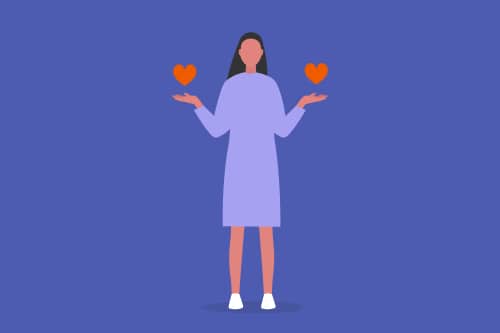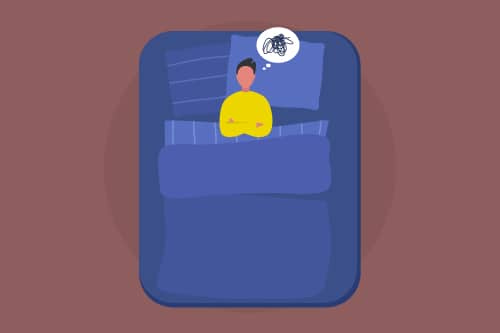How to Have a Good Relationship with Yourself? HealthifyMe Blog HealthifyMe Blog - The definitive guide to weight loss, fitness and living a healthier life.
Summary
When did you stop loving yourself? What prevented you from being in a relationship with your own self? This article explores why it is vital to start connecting with oneself. It provides different ways you can start becoming your own close friend.
Therapy can help you get insight about yourself. Connect with our expert therapist here!
“Love yourself first and everything else falls into line.
You really have to love yourself to get anything done in this world.”
– Lucille Ball
Think about a time when you said I love you to yourself. Was it this week or last month? Did you wholeheartedly mean it? We often spend our time trying to make others like us and accept us for who we are. You may go out of your way to help and support others. Do things for them which will make them happy and satisfied. But have you wondered what would happen if you put almost the same amount of effort for yourself? What changes will you see?
As we grow up, we are conditioned to keep others in mind while doing anything. Getting good grades by studying hard, being good enough kids for our parents & caregivers, etc. The focus is majorly focused on others around you than your own self. For most individuals, the journey of turning inwards starts towards the end of adolescence. This is when they focus on what they want for themselves. As we grow older, we try finding what makes us unique. This is one of the crucial things you do for yourself.
What does a relationship with oneself mean?
In a nutshell, having a relationship with oneself means having a deeper understanding of what you like, what are your needs and wants. It means being your own favourite companion. It doesn’t come from a place of how others can help you fulfill that, but how you can find a way of meeting those needs by yourself.
Instead of waiting for others to validate you, you validate yourself. It means you treat yourself with kindness and accept your entirety; the good and the bad. A relationship with oneself starts by you identifying what is that makes you loveable and providing the same. It means enriching, nurturing and supporting yourself through the difficulties of life.
Is focusing on your own self, selfish?

We have been brought by messages that doing things for yourself is selfish. We have witnessed people around us giving up parts of themselves for others. Doing things according to how others want, rather than looking inside of what they really want. In the process, they question how and what is helping them or giving them happiness. This leaves us with regret, guilt, disappointment.
Having a relationship with yourself helps you recognise what works for you and does not. It helps you understand how much you can provide for others without draining or undermining yourself. It’s like how the metaphor goes “You can’t pour from an empty cup”. Prioritizing self does not mean that you give up doing things for others or avoid compromising. It means honoring what works for you and setting boundaries for what doesn’t.
Ways to have a relationship with oneself
Starting the journey to turn inwards and focusing on yourself might seem like a big task at first. It’s important to know who you are doing this for yourself! Here are some ways you can begin and strengthen your relationship with your own self.
#1 Awareness

The most important step is to be aware of yourself. This includes your thoughts, feelings, actions, even your intentions and triggers. This helps you to dive into your inner rich world and have a better insight about who you are.
#2 Self-care

Taking time and attending to your needs is one of the best ways to be your own ally. Start with getting your basic needs met such as, giving your body enough sleep and rest, taking breaks and eating right. Mental hygiene is essential too. You can do it by being less critical of yourself, setting boundaries and giving time for your mind to relax.
#3 Acceptance

Choosing yourself despite your life experiences, thoughts and action (or inaction!) is one of the hardest yet most rewarding. The inner critic can point out hundreds of failures, mistakes and flaws. But accepting them and looking how far you’ve come, despite that, makes you a stronger person.
List down the things you feel are a challenge for you. Instead of fighting the critical voice, try to listen and acknowledge its presence. Accepting can reduce the intensity of the voice and eventually help you manage it better.
#4 Unconditional love

We look for being loved without having any conditions or expectations. We want to be loved for who we are. The only way you recognise what that is, is by loving yourself without any conditions.
Thoughts like I ‘will love my body only if I can lose this much weight’, ‘I will be more confident about my capabilities after I get that promotion’ are ways to place conditions on yourself. These get in the way of you loving yourself for who you are right now. Start by saying daily affirmations about yourself.
#5 Stop pressuring yourself

Expectations from loved ones, friends and work may make you feel burdened. Often in trying to fit into the buckets of how others will think of me if I do not meet their needs, keep you away from meeting your own.
Your own goals might feel overwhelming if they are huge and unrealistic. Take it slow. Have a conversation with yourself to understand what feels right to you at the present moment.
#6 Seek help

Starting to turn inward and focusing on yourself can feel startling and eye-opening. Working with a therapist helps you feel safe and supported. They can guide you to navigate this uncharted territory. Your therapist can gently help explore and work on aspects of yourself that might be limiting you. They work with you and at your own pace instead of rushing into the process. You can look up our experts and connect with them here.
Conclusion
The relationship that we have with oneself is unique and beautiful. Having a healthy connection helps you feel safe and secured, even during struggling times. It raises your self-esteem, improves the way you perceive yourself and others.
Becoming emotionally available for yourself and catering to your needs, helps you also improve your relationship with others. Knowing you can trust and rely on yourself, you can achieve anything that you strive for.
Frequently Asked Questions (FAQs)
A. Starting by giving yourself the permission to bring your attention to you. Begin with small steps. It can be doing one act of self care regularly.
A. The inner self critical voice can be very harsh. It can lead you to go in a negative thought spiral. Try saying out loud positive affirmations to yourself daily. It will reduce the intensity of the voice. Working with a therapist can be very helpful in learning how to manage the critical voice.
A. It’s understandable. Prioritizing yourself can seem difficult and overwhelming. This change is going to affect others who have been gaining benefit from you prioritizing them. It can be in terms of basic household chores or you saying no to taking additional work. Reflect upon what is more important for you – what will others think of me versus how will I think of myself.
The post How to Have a Good Relationship with Yourself? appeared first on HealthifyMe Blog.
from HealthifyMe Blog https://ift.tt/39hOaeW
Post a Comment
Post a Comment